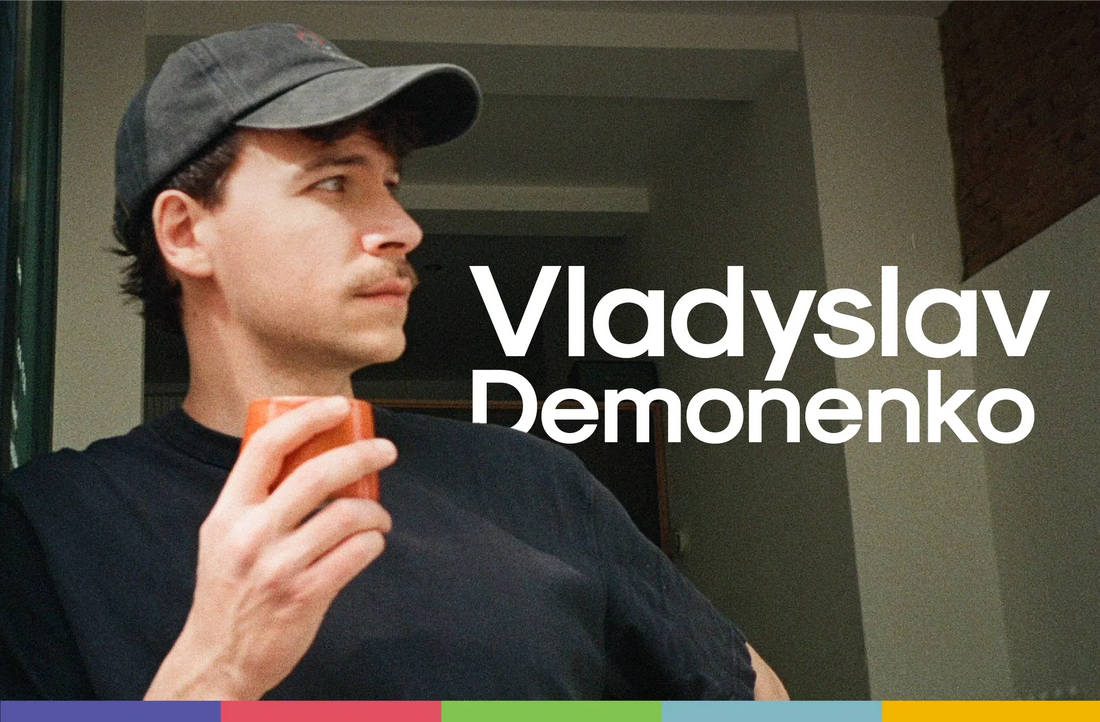Inside his café in Berlin (Kolo), Vladyslav Demonenko radiates a rare calm. The café is usually busy, yet Vlady speaks to us with a quiet focus about coffee, competition, inspiration, and… pizza.
You seem super busy running Kolo, how’s it going?
“We’ve got a good vibe here. It’s busy, but we love it. Alongside running the café, we’re working on something new: a non-alcoholic cocktail menu. We’re building it ourselves, kind of like a mixology bar, but without alcohol. I’m working on it with Long, my colleague. It’s exciting because we’re creating flavors from scratch, in our own style.”
And on top of that, you’re preparing for the World Coffee in Good Spirits Championship?
“Yes, everything’s going smoothly. I’ve found a new roasting profile on the LINK that brings out really intense, silky, floral notes. It’s a coffee I’m truly happy with. Now I have to decide what alcohol to use.”
How do you prepare when you don’t know the alcohol you’ll be working with yet?
“That’s the thing with CiGS — you wait for a sponsor to confirm the spirit. Until then, you focus on the concept, the structure, the feeling. I know what I want to express: a routine based on memories and aromas. I want the judges to experience something that reminds them of a moment they didn’t know they remembered.”
This is your third time competing at the world level, but your first representing Germany?
“That’s right. I never imagined I’d represent Germany. I’ve only lived here for three and a half years. Until recently, CiGS wasn’t active here. The last competition was in 2019. But this year, 17 people signed up. It’s growing again.”
You’re planning to use the same coffee you won the national title with — a Java from Las Flores in Colombia? What makes it special for you?
“It holds more than just flavor notes. I visited the farm in February — probably my tenth time visiting origin — but this trip was different. It wasn’t about buying coffee; it was about people. Their energy and way of life made me feel more responsible for what I serve. When Diego Vergara, the producer, came to Berlin later, it really closed the circle. There’s a deeper understanding now.”
You’re coaching a Brewers Cup competitor from Ukraine remotely this year. How does that work when taste is such a tactile experience?
“We use the same roast profile, the same setup — even the same water,” he explains. “It’s distilled with minerals added, from Apax. That way, we’re tasting the same thing, even from different countries. Honestly, it works surprisingly well. It’s kind of fun.”
You seem incredibly calm. Does it ever feel like too much?
“I don’t really have a big plan, and honestly, I don’t need one. I’ve learned I do better when I don’t overthink. The competition is for me. I do it because it’s fun.”
But surely you’re paying attention to the bigger picture?
“Competitions follow trends. The key is knowing when to align with them and when to bring something different. I don’t want to repeat anything I’ve done before.”
Who’s on your team?
“Long will come with me. Then there’s Nicole Battlefield Montgomery, and the roastery — Roestate. They give me space to practice, and we work on sensory stuff together. And of course, SCA Germany helps a lot, especially with mental and financial support.”
What about on the day of the competition — any rituals?
“I’ll explore the city, find a good slice of pizza, and not stress. That’s the plan.”
And with that, Vladyslav Demonenko returns to his calm preparation, ready to bring something unforgettable to the world stage.




